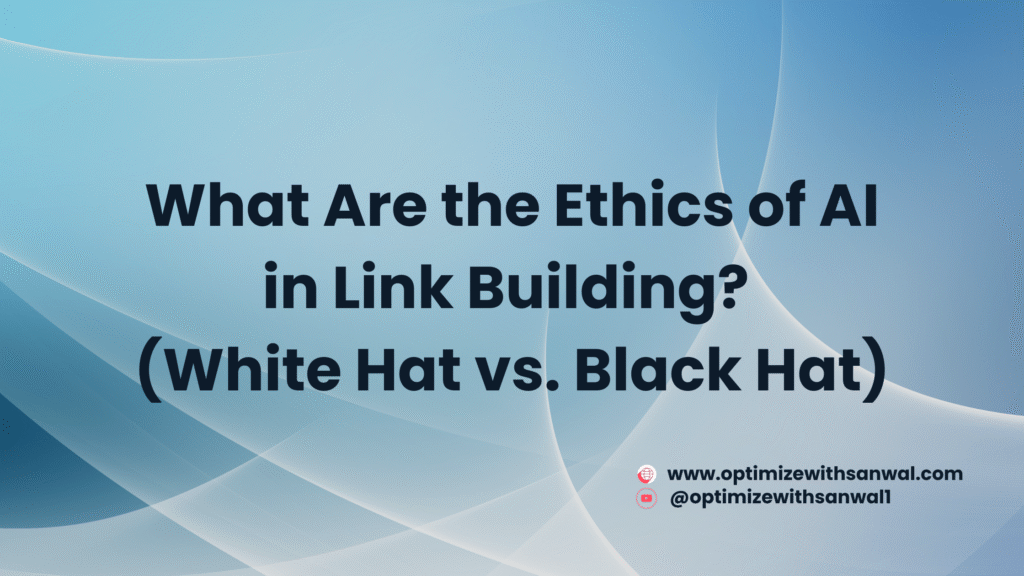As agency owners and senior SEOs, our reputation is our most valuable asset. The rise of AI in link building presents a powerful opportunity for efficiency, but it also opens a Pandora’s box of ethical questions. Where does smart automation end and deceptive spam begin?
In this guide, I’m not going to give you more tools. I’m going to share my framework for using them responsibly. This is a core part of the strategy I discussed in my main guide, How Will AI Change the Future of Link Building and Digital PR?, and it’s crucial for building a sustainable, long-term strategy.
What is Google’s View on AI in Outreach?
First, let’s address the big question about Google’s view on AI link building. While Google hasn’t issued a specific guideline on AI for outreach emails, we can infer their position from their stance on AI-generated content. The rule is simple: quality and intent matter more than the method of creation.
Spam is spam. A low-quality, generic, mass-sent email is spam, whether it was written by a human intern or a sophisticated AI. Conversely, a helpful, personalized, and relevant email is a valuable piece of communication. The tool doesn’t matter; the intent and the quality of the final output do.
Where is the “White Hat” Line for AI in Link Building?
In my view, the ethical, “white hat” use of AI is all about assistance and enhancement. It’s about using AI to help a human do their job better and faster. This is the foundation of responsible AI for SEO.
Here are some clear examples of “white hat” uses:
- Enhancing Research: Using AI for prospecting and qualification to find more relevant targets, as we discussed in our guide on AI for link prospecting.
- Assisting Personalization: Using AI to analyze a prospect’s content to find genuine personalization hooks, making your outreach less generic and more respectful.
- Improving Writing: Using AI as a grammar checker, a tone assistant, or a brainstorming partner to make your emails clearer and more professional.
The core principle of white hat use is this: The AI assists the human strategist, who remains in full control.
Where Do You Cross into “Black Hat” Territory?
You cross the line into unethical, black hat AI SEO the moment you remove meaningful human oversight and prioritize scale over relevance and consent.
Here are some clear examples of “black hat” uses:
- Mass, Non-Personalized Automation: Using AI to generate and send thousands of identical, templated emails to an unvetted list. This is the definition of is AI outreach spam.
- Deceptive Personalization: Using AI to insert fake personalization that isn’t based on genuine research (e.g., “I loved your recent article on [Topic they never wrote about]”).
- Fully Automated Conversations: Using bots to handle follow-ups and negotiations without any human involvement, creating a deceptive experience for the recipient.
The core principle of black hat use is this: The human is removed from the process, and the goal is pure automation.
How Can You Build a Framework for Responsible AI Use?
As a leader, your job is to set clear guidelines. I recommend creating a company-wide AI usage policy for your outreach team. To help with this, you can even use AI to police your AI-assisted work. I use a prompt like this to check my team’s emails before they go out.
ROLE: You are an expert in brand reputation and ethical business communication.
TASK: Review the following outreach email draft.
CONTEXT: I need to ensure this email, which was assisted by AI, sounds authentic, respectful, and non-spammy. It must feel like a genuine, one-to-one communication from a peer.
OUTPUT FORMAT:
Provide a simple “Pass/Fail” rating and a bulleted list of any specific phrases or sentences that sound robotic, deceptive, overly aggressive, or like generic spam.
EMAIL DRAFT:
[Paste your AI-assisted email draft here]
My Final Thoughts
The ethics of AI in link building are not in the tool itself, but in how we, as strategists, choose to use it. The temptation to automate everything is huge, but the long-term cost to your reputation is not worth the short-term gains. By focusing on strategies that enhance human connection and genuine personalization, you can build a sustainable link building program that gets results without sacrificing your integrity.
Disclaimer
All information published on Optimize With Sanwal is provided for general guidance only. Users must obtain every SEO tool, AI tool, or related subscription directly from the official provider’s website. Pricing, regional charges, and subscription variations are determined solely by the respective companies, and Optimize With Sanwal holds no liability for any discrepancies, losses, billing issues, or service-related problems. We do not control or influence pricing in any country. Users are fully responsible for verifying all details from the original source before completing any purchase.
About the Author
I’m Sanwal Zia, an SEO strategist with more than six years of experience helping businesses grow through smart and practical search strategies. I created Optimize With Sanwal to share honest insights, tool breakdowns, and real guidance for anyone looking to improve their digital presence. You can connect with me on YouTube, LinkedIn , Facebook, Instagram , or visit my website to explore more of my work.


